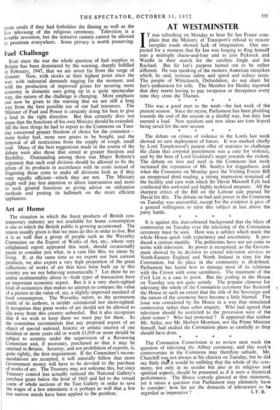AT WESTMINSTER
IT was refreshing on Monday to hear Sir Ian Fraser com- plain that the Ministry of Transport's refusal to restore turnpike roads showed lack of imagination. One sus- pected for a moment that Sir Ian was longing to fling himself into a midnight chaise-and-four and to join Pickwick and Wardle in their search for the carefree Jingle and his Rachael. But Sir Ian's purpose turned out to be rather different. He was speaking of the modern American turnpikes which, he said, increase safety and speed and reduce taxes. The people of Whitchurch, Oxfordshire, do not share Sir Ian's enthusiasm for tolls. The Member for Henley reported that they resent having to pay twopence or threepence every time they cross the Thames. * * * * This was a good start to the week—the last week of the present session. Since the recess, Parliament has been plodding towards the end of the session in a dutiful way, but duty has seemed a load. New speakers and new ideas are (one hopes) being saved for the new session. * * * * The debate on crimes of violence in the Lords last week showed no new deployment of forces. It was marked chiefly by Lord Templewood's patient offer of statistics to challenge the claim that corporal punishment was a cure for violence, and by the heat of Lord Goddard's anger towards the violent. The debate on iron and steel in the Commons last week increased the reputation of Mr. Sandys for doggedness; and when the Commons on Monday gave the Visiting Forces Bill an unopposed third reading, a strong impression remained of the lucidity and care with which Sir David Maxwell Fyfe had conducted this awkward and highly technical measure. All the sharpest critics of the Bill on the Labour side praised Sir David for this. The debate on fuel and power in the Commons on Tuesday was uneventful, except for the evidence it gave of a general willingness to raise this subject at last above the party battle.
* * * * It is against this dun-coloured background that the blaze of controversy on Tuesday over the televising of the Coronation ceremony must be seen. Here was a subject which made the whole House quick with expectancy and uncertainty. It pro- duced a curious muddle. The politicians have not yet come to terms with television. Its power is recognised, as the Govern- ment showed by its decision to extend television services to North-Eastern England and North Ireland in time for the Coronation, but its place in the community is ill-defined. Parliament has learnt how to manage most of its relations with the Crown with some seemliness. The treatment of the Civil List is a case in point. But the jostling in the House on Tuesday was not quite seemly. The popular clamour for televising the whole of the Coronation ceremony has flustered the House to such an extent that the role of the Sovereign and the nature of the ceremony have become a little blurred. The issue was considered by the House in a way that stimulated controversy rather than sober enquiry. Who had agreed that television should be restricted to the procession west of the choir screen ? Who had protested ? It appeared that neither Mr. Attlee, nor Mr. Herbert Morrison, nor the Prime Minister himself, had studied the Coronation plans as carefully as they should have done. * * * * The Coronation Commission is to review next week the question of televising the Abbey ceremony, and this week's controversies in the Commons may therefore subside. Mr. Churchill wainot always at his clearest on Tuesday, but he did say flatly thaT it would be unfitting that the whole of the cere- mony, not only in its secular but also in its religious and spiritual aspects, should be presented as if it were a theatrical performance. The House scarcely glanced at that statement, yet it raises a question that Parliament may ultimately have to consider: how far are the demands of televiewers to be regarded as imperative ? . ' I. F. B.


































 Previous page
Previous page